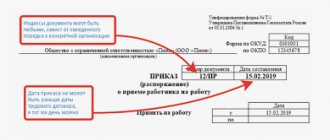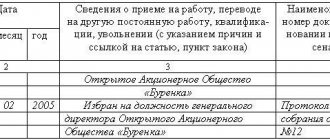Standards base
The Labor Code and the Constitution of the Russian Federation are the main documents that regulate labor relations and fix human rights. According to them, the employer has the right to elect a candidate for a vacant position. Simply put, the potential applicant will be assessed by the employer in terms of his requirements. The decision to hire an employee depends not only on his business qualities, but also his personal ones, because this is the key to successful work. The balance between employee and employer is the main state interest. For this reason, a potential candidate does not have the right to be rejected by an employer without compelling reasons.
An employer, thinking about making a decision on concluding an employment contract with a candidate, has the right to put forward his own conditions. For example, it is quite reasonable if he wants to find out characteristics regarding the candidate’s former professions, or find out what kind of education he received.
The legislation of the Russian Federation has provided for justifications for refusal to hire.
It can be obtained by persons of certain categories, most of whom have not yet reached the age of majority, under the following conditions:
- The work requires financial responsibility.
- The work process is very unsafe for health.
- You need to work underground.
- There is a threat to the development of morality.
- The job requires moving heavy objects that exceed the permissible limit.
- Required to keep a watch
Another significant motive, taking into account which the employer will be justified, is an employee with a negative medical examination report.
The law on refusal to hire and who it applies to
Article 64 of the Labor Code of the Russian Federation provides that the rejection of a request for a position cannot apply to the following persons:
- For expectant mothers and established mothers.
- Employees who have received an invitation to a vacant position from another organization.
- Persons elected to office.
- Workers who, after the competition, will fill vacant jobs.
- Persons who wrote a statement of claim and achieved the conclusion of a labor agreement.
- Citizens with disabilities and the right to a quota.
- People with HIV infection, if the disease is indicated as the reason for refusal.
- Citizens who do not have a residence permit at their place of residence.
- Employees of trade union organizations, if they were fired due to the end of their powers provided for by a certain period.
- Every citizen, if the reason for refusal relates to a trade union, namely belonging or not belonging to it.
- To each person, if the basis for refusal is gender, religion or nationality.
The refusal is unfounded, how to determine it
The request to conclude a labor contract has been rejected, and then the applicant wonders if there are grounds for this. Again, Article 64 of the Labor Code of the Russian Federation will come to the rescue.
Unfounded reasons are:
- Absence of an existing reason, the employer had to provide one.
- A person who came for an interview because of his gender was rejected, that is, he became a victim of discrimination.
- The refusal does not affect the business qualities of a potential candidate.
Every citizen has the right to appeal a refusal to hire, but it is better to use the services of a lawyer. Refusal to work should not confuse a person. If it has already happened, then it is better to take care of obtaining a written document of refusal, which should indicate all objective reasons. It will be difficult to defend your legal rights if there is no such “ace in the hole”.
IMPORTANT !!! Based on the above reasons, we can safely say that they may not be hired for just two reasons. The applicant lacks business qualities for work - this is the first. Failure of the applicant to fulfill the claims provided for by law is the second.
To better understand, it’s worth considering everything in a fictitious case: a builder, who is also an engineer by education, was denied admission to the workforce because of his education as an economist. Or, as an alternative, one example - a minor applicant was not hired for work because it was performed under conditions harmful to health. The situation is more complicated when a person is refused due to business qualities. In this matter, unfortunately, the current legislation has not provided any formal arguments to clearly explain this term.
Seven days until failure
The adopted law scared many employers and raised a lot of questions. The new law protects candidates, but does not provide clear instructions for employers, which is why there are different interpretations of the document and potential risks for companies. And as a result - significant material costs.
It is necessary to understand what can be considered a fact of refusal to a candidate. The law does not provide a clear answer to this question. Based on expert practice, the following can be considered a refusal: a written negative response, if the employer uses the services of sites for searching and recruiting personnel and uses the automatic function of refusing the candidate; direct verbal refusal based on the results of the interview. In addition, the employer's silence can also be assessed as a refusal. For example, if after the interview the candidate was promised to give an answer within a week, but the answer from the employer never came. You should not wait for an invitation to an interview if the vacancy is closed due to the lack of need for it.
In all of the above cases, the employer is already obliged to provide a written response within seven days about the reasons for the refusal if a corresponding request is received from the candidate. Previously, the Labor Code did not set any deadlines for such a refusal, although it required reporting the reason for the refusal. It is the new requirement to give a refusal within seven days that aggravates the situation. The law does not provide a clear interpretation of the moment of interaction with a candidate the obligation to provide a written refusal within a week arises, which provides a wide field of activity for manipulators of the law and labor scammers who do not plan to work for the company at all, and their goal is to make money from different employers . In other words, the employer is obliged to provide the candidate with some kind of answer within seven days; if he remains silent and does not give an explanation of the refusal, accordingly, he is already violating the law.
It should be noted that a number of companies receive hundreds of resumes - 600 or more - and the employer’s HR service may not physically have time to review the submitted resumes, and the candidate may perceive the employer’s “silence” as a refusal and demand an explanation. It turns out that the employer, having not yet begun to review the candidate’s resume, is already obliged to provide an explanation of the refusal. It is this point that is not regulated in any way in the law and provides the opportunity for many interpretations. The new law amends Article 64 of the Labor Code of the Russian Federation. Employers will be held administratively liable for failure to comply with the new requirements.
What is considered a candidate's requirement to provide an explanation? The law does not provide clear explanations at what point the employer becomes obligated to provide an explanation in a written refusal.
If, for example, an applicant wrote to the company’s general email with a request to explain the reason for the refusal, then the company is not obliged to respond to this request. And if he wrote to the email that was indicated in the vacancy announcement, then the company is obliged to provide a response to the candidate. A letter delivered by Russian Post or courier service can also be considered a candidate requirement. Oral statements from candidates may not be considered as a requirement.
What does the employer need to indicate in the response about the reasons for the refusal? Any reasons based on unsuitable business and qualifications of the candidate may be mentioned. At the same time, it is strictly prohibited to indicate discriminatory reasons, which are specified in Art. 3 Labor Code of the Russian Federation.
Also, a candidate cannot be refused if the candidate is pregnant; if he turned out to be disabled and was sent under a quota from the employment service or invited by transfer from another company.
According to the new law, the employer bears judicial and inspection risks. In some cases, the company may also face criminal liability. In particular, for an unreasonable refusal to hire and conclude an employment contract with a pregnant woman or a woman with children under three years of age, against the head of a company or other person who is authorized to make a decision on hiring. Article 145 of the Criminal Code of the Russian Federation provides for criminal liability: a fine of up to 200 thousand rubles. (or in the amount of wages or other income of the convicted person for a period of up to 18 months), compulsory work for a period of up to 360 hours.
Litigation risks should be expected if a candidate successfully appeals a refusal to hire. A court decision may recognize an unreasonable refusal to hire and, accordingly, satisfy the requirement for compensation for forced absence and compensation for moral damage. It is good that the court does not have jurisdiction to force a candidate to enter into an employment contract under certain conditions. However, employers are not protected by law. In court, the most difficult thing will be to determine whether the candidate meets the established criteria. Each individual judge will interpret, for example, such a concept as “work experience” in his own way. And if an employer rejects a candidate due to lack of experience, then the criterion is very controversial and can be interpreted in different ways. Now the employer needs to advertise with a very detailed description of the function of the position. However, for a number of companies this actually means disclosing a trade secret. And if you do not provide a detailed description of the vacancy, the risk of litigation increases accordingly. In the event of a lawsuit, candidates may be entitled to compensation for forced absence for the entire duration of the trial and compensation for moral damages. In my practice, there was a case when a candidate filed a claim in court for compensation for forced absence and demanded compensation of 8 million rubles.
An inspection risk may arise if it is discovered that a written explanation of the reasons for the refusal was not provided within the specified period. Then a fine of 30-50 thousand rubles may be imposed.
To minimize risks and protect yourself from manipulators, I recommend that companies review the text of job advertisements. It is also necessary to make the requirements in your resume as detailed as possible. And also create a local regulatory act defining the admission procedure and familiarize candidates with it.
Refusal to work, what it looks like correctly
A failed employment contract, and its written proof, is not the main problem. It is also necessary to check whether it is compiled correctly.
The document must necessarily indicate:
- The name of the organization without abbreviations (that is, without any abbreviations, all in full words).
- Signature of the owner of the organization, or the person whose competence includes hiring employees.
- Seal of the organization.
ATTENTION !!! It is important to understand that only a written document on refusal to hire, correct for the court, can be considered as significant evidence. The court, when dealing with the case, may find out that the name of the organization, the names of its leadership or the seal do not actually correspond to what is written, and the document will be considered invalid.
Discrimination is prohibited
It will be considered discrimination if the employer’s representative refuses to provide the applicant with a job for the following reasons:
- Belonging to race, national origin and skin color.
- His place of residence and registration.
- Family origin, language he speaks.
- Gender, number of years.
- The financial and property status of the candidate.
The list of reasons for refusing to hire an applicant for a position specified in the Labor Code of the Russian Federation is open, so an employee may consider that he has been discriminated against due to his sexuality, weight, height, or appearance.
The question of whether there was discrimination in each specific case or not is decided by the judge.
Actions upon receiving a refusal without reason
Everyone wants to work. Refusal to hire, thanks to the law of the Labor Code of the Russian Federation, Part 6, Article 64, can be appealed in court. It is worth knowing that, when deciding to resolve the problem, a person who has received a refusal should not be sent to the labor inspectorate for an investigation. They will not take on this matter; their competence does not extend to such problems. The legislation of the Russian Federation stipulates that only courts of district divisions have the right to deal with such cases. It is in such courts that you should hurry to file a claim to review the refusal. Why does this need to be done quickly?
IMPORTANT !!! After three months, the refusal will not be considered, since only during this time period can you present your claims to the unscrupulous employer. A person who is faced with the problem of refusal when applying for a job of interest can try to compensate for all the harm caused to him through legal proceedings.
The main criterion for a petition filed with the court that the plaintiff must adhere to is that the denial of the request for admission to the state is unequal.
It is absolutely necessary in a statement to the judge to ask the unscrupulous employer to answer for his actions:
- To pay damages.
- Carry out moral compensation.
- Sign the employment agreement.
What claims will be made against the employer is the plaintiff’s decision. Only he has the right to decide what to present to his offender, taking into account his personal beliefs. Of course, the plaintiff should not hope that as soon as the trial is over, the employer will still want to put the employment contract into effect. But what has to do with an applicant who has faced discrimination and his compensation of a moral nature is a mandatory condition. It is precisely in accordance with this circumstance that almost every petition regarding the groundlessness of a refusal to hire a staff member is granted. When going to court, the applicant must unconditionally pay a municipal fee. The establishment of such a condition is based on the precedent that an applicant who has been refused is listed as unemployed and such benefits as for workers are not taken into account for him.
ATTENTION !!! If the plaintiff’s request to hire was denied, and the court decided that it was unlawful, then the unscrupulous employer is obliged to fulfill all obligations that the court will provide—to reimburse expenses and restore all losses.
But only irrefutable evidence will help the plaintiff win in court a case regarding unlawful refusal to work or discrimination against his person. The laws of the Russian Federation do not provide for exceptions regarding discrimination, and therefore, the main requirement put forward by the courts of the Russian Federation in such cases is the provision of significant evidence of their claims and disagreement on anything on both sides (plaintiff and defendant). A refusal in writing from the applicant under any circumstances will be required by the court (this was already discussed above in the article). Without such a document, there is little chance of winning the case.
Rules for filling out a statement of claim
Before sending a claim to court, you should understand how to fill it out. A properly completed document is the first step towards a successful outcome of the case.
The application should look like this:
- A cap. Information about the court to which the document is sent, the full initials of the plaintiff, where he lives, what number he can be contacted at, optional email address, information about the defendant, and again, his contact information are indicated.
- The name of the document being sent. Example: “Statement of claim for recognition of the refusal to hire as illegal and for the obligation to conclude an employment contract.” If the claim is sent to court for damages, then indicate exactly this reason.
- Text. Here you must provide all the information that you were refused when trying to get a job. Also, you should provide the available evidence about what happened and all the circumstances occurring at that moment.
- Request. The plaintiff must clearly state what he is asking from the court, and it is important to start writing with the word “I ask.”
- Available applications. It is necessary to attach to the document the available written evidence of the fact of refusal, as well as a copy of the claim itself and, necessarily, a copy of the letter of refusal to hire.
Court decision of 04/30/2020: refusal to hire (job offer)
Share
The applicant received a written job offer for the position of chief accountant, signed by five officials (general director, executive director, HR director, chief accountant and head of the personnel selection department). As you understand, the person had no reason not to trust this “document,” but in vain.
The proposal included the following information: position (chief accountant of such and such LLC), date of hire (05/01/2019), probation (6 months), salary.
There was also an SMS correspondence in which various conditions were determined (testing using a polygraph, length of work, payment of compensation for renting a living space, provision of an additional document on higher education to replace the lost one). Pay attention to the last sentence; in court, they talked about the loss of an education document due to a fire. Actually, who should have provided what? Unclear.
On April 24, 2021, the plaintiff quit his previous job, and immediately after his dismissal, he was refused employment over the phone.
After the plaintiff received a response to his demand for an explanation of the reasons for the refusal to conclude an employment contract (by the way, on time, within 7 working days, as required by Part 5 of Article 64 of the Labor Code of the Russian Federation), he files a lawsuit. The court refuses .
The cause-and-effect relationship between the plaintiff’s dismissal from his previous job and the defendant’s actions in refusing to hire him has not been established.
One of the requirements for acceptance to the position of chief accountant was the presence of a higher economic education in the specialty, knowledge of the programs 1C 8.3, 1C ZUP, 1C, which was not confirmed by the Plaintiff, the vacancy was filled.
Do you know what's strange? The proposal was signed by representatives to occupy a position in, and the same “B” wrote a written refusal. What does organization “A” have to do with it? Management Company?
There are several decisions on the website denying employment (dated 02/28/2020, 08/29/2019 and 12/08/2016), which are very interesting.
Determination of the Investigative Committee for civil cases of the Eighth Court of Cassation of General Jurisdiction dated April 30, 2021 in case No. 8G-5150/2020[88-6667/2020]
Judicial Collegium for Civil Cases of the Eighth Court of Cassation of General Jurisdiction, consisting of
presiding Frolova T.V., judges Prudentova E.V., Kozhevnikova L.P.
considered in open court civil case No. 2-1019/2019 (UID: 75RS0025-01-2019-001230-31) on the claim of the full name against the LLC for recognition of the refusal to hire as illegal, recovery of damages, compensation for moral damage, on a cassation appeal representative's full name - full name on the decision of the Chita District Court of the Trans-Baikal Territory dated August 21, 2021 and the appeal ruling of the judicial panel for civil cases of the Trans-Baikal Regional Court dated November 19, 2019.
Having heard the report of the judge of the Eighth Cassation Court of General Jurisdiction, T.V. Frolova, the Judicial Collegium for Civil Cases of the Eighth Cassation Court of General Jurisdiction
installed:
Full name (hereinafter - full name, plaintiff), represented by a representative of full name (hereinafter - full name), filed a claim against LLC (hereinafter - LLC, defendant) to declare the refusal to hire illegal, to recover damages, and to compensate for moral damages.
In support of the stated requirements, the representative of Full Name - Full Name indicated that Full Name worked in the position of “data seized” LLC. In order to find a new position with more favorable conditions and a high salary, the full name posted an advertisement and a job search resume on the website “hh.ru”.
A message was sent to the full name by email with an offer to contact and consider the issue of changing jobs. The sender was B.A.V.
, a message was received from L.O.A. from the email address “data seized.” with a proposal to send copies of the passport, work record book and the submitted sample questionnaire for consideration of a candidacy for the vacant position of chief accountant in the LLC, a document form of the questionnaire to be filled out is attached to the message. After this full name, a draft job offer is sent , which includes all the conditions about the position and place of work, the date of starting a new job, work schedule, wages and other conditions that can be attributed to the terms of the employment contract agreed upon by the parties.
Full name, at the invitation of the defendant had an in-person interview at the office located at the address: “address”, on April 12, 2021, full name received a job offer agreed upon and signed by the employer’s executive officers , signed by full name and sent to the employer on April 15, 2021, and referral for a medical examination (examination), a list of documents required when applying for a job.
The full name considers the submitted proposal to be a preliminary agreement entailing certain legal consequences and obligations for the parties. As follows from the content of the job offer, it was signed by the appropriate persons of the management of the legal entity, came from a representative of the employer, and also contains mandatory conditions, the list of which is defined in Part 2 of Article 57 of the Labor Code of the Russian Federation, therefore, it can be considered that through the offer regarding the work, the parties actually entered into an employment contract, which means that the employer is obliged to hire the candidate.
Also during the specified period between full name and B.A.V. SMS correspondence was carried out in order to agree on other organizational issues and terms of employment, wages, work terms, etc. As follows from the content of this correspondence, an agreement was reached between the employer and full name regarding the need to undergo polygraph testing, an interview, and the period of work (at least a year), on the payment of compensation for sub-rental housing in the amount of 25,000 rubles during the year, on the provision of an additional document on higher education to replace the lost one.
B.A.V. is the chief accountant of the LLC, that is, an official with the right to sign on behalf of the employer and the functional head of the newly employed full name. In this regard, any actions of B.A.V. full names were considered as coming directly from the manager and any agreement on this or that issue was regarded as agreement on the terms of the employment contract.
The date of entry to work was set as May 1, 2021, while his full name, in connection with the availability, in his opinion, of career growth opportunities, the most favorable working conditions in the LLC and, in agreement with the defendant, resigned from the LLC on April 24, 2021. Due to the fact that the application for voluntary resignation was submitted to the LLC two weeks earlier, that is, on April 14, 2021, the full name had the opportunity provided by law to change the decision and refuse dismissal and continue working in the LLC . At the same time, the defendant was guaranteed employment with his full name, no notifications about the opposite full name were received before the expiration of the two-week period, so he realized his intention to quit . The dismissal was due precisely to the defendant’s continued employment; he had no other motives for terminating his employment relationship with the LLC. Immediately after the dismissal, my full name was verbally denied employment over the phone.
On May 14, 2021, his full name was answered, according to which the reason for the refusal to conclude an employment contract with him was the filling of the vacancy of a chief accountant and the failure to provide an education document, which did not allow confirming the level of qualifications and the presence of special knowledge.
The full name considers this basis for refusal of employment to be far-fetched and unfounded. The defendant did not express any doubts regarding his professional suitability . The unlawful actions of the defendant resulted in a significant violation of the rights of the full name, causing material damage in the form of forced dismissal from a previous job, loss of guaranteed earnings and non-receipt of wages from the defendant for an agreed period of at least 12 months.
The amount of full name salary for the period in the position of chief accountant from May 1, 2021 to May 1, 2021 in accordance with the terms of the job offer, the content of correspondence without additional allowances and bonus payments is 1,440,015.3 rubles. The average monthly income of a full name for the period of work in the LLC in 2019 was 200,111.49 rubles, and the amount of income received would have been 2,401,337.94 rubles. Due to the fact that there is a direct cause-and-effect relationship between the defendant’s refusal to hire and the adverse consequences that occurred in the form of non-receipt of wages, he believes that the amount of damage caused in the form of lost earnings for 12 months is subject to recovery from the defendant. The parties reached an agreement to accrue full name compensation for subletting residential premises for a period of work for a period of at least one year in the amount of at least 25,000 rubles. Also, at the request of the employer, the plaintiff conducted a medical examination, the costs of which amounted to 8,302 rubles.
Representative Full Name - Full Name, taking into account the clarification of the claims in accordance with Article 39 of the Civil Procedure Code of the Russian Federation, asked the court to declare the defendant’s refusal to hire Full Name illegal, to recover the amount of damages in the form of lost wages in the amount of 800,445.96 rubles, damages in the amount of 8,302 rubles, compensation for moral damage in the amount of 2,000,000 rubles.
By the decision of the Chita District Court of the Trans-Baikal Territory of August 21, 2021, left unchanged by the appeal ruling of the judicial panel for civil cases of the Trans-Baikal Regional Court dated November 19, 2021, the full name was denied.
In the cassation appeal, the representative Full Name - Full Name raises the question of canceling the decision of the Chita District Court of the Trans-Baikal Territory dated August 21, 2021 and the appeal ruling of the judicial panel for civil cases of the Trans-Baikal Regional Court dated November 19, 2019, as illegal.
The persons participating in the case are duly notified of the time and place of consideration of the case by the court of cassation.
The plaintiff, full name, and the representative of the defendant LLC did not appear at the court hearing of the cassation court; they did not provide information about the reasons for the failure to appear.
The Judicial Collegium for Civil Cases of the Eighth Court of Cassation of General Jurisdiction, guided by the provisions of Part 5 of Art. 379.5 of the Civil Procedure Code of the Russian Federation (hereinafter referred to as the Civil Procedure Code of the Russian Federation), considers it possible to consider the case in the absence of persons participating in the case who have not appeared.
Having checked the case materials and discussed the arguments of the complaint, the judicial panel for civil cases of the Eighth Court of Cassation of General Jurisdiction finds the complaint not subject to satisfaction.
In accordance with Part 1 of Art. 379.6 of the Code of Civil Procedure of the Russian Federation, the cassation court of general jurisdiction verifies the legality of judicial decisions adopted by the courts of first and appellate instances, establishing the correct application and interpretation of the rules of substantive law and rules of procedural law when considering a case and adopting the appealed court decision, within the limits of the arguments contained in the cassation appeal, presentation , unless otherwise provided by this Code.
In the interests of legality, a cassation court of general jurisdiction has the right to go beyond the arguments of a cassation appeal or presentation. At the same time, the court does not have the right to check the legality of court decisions in the part in which they are not appealed, as well as the legality of court decisions that are not appealed (Part 2 of Article 379.6 of the Code of Civil Procedure of the Russian Federation).
The grounds for canceling or changing court decisions by a cassation court of general jurisdiction are the discrepancy between the court’s conclusions contained in the appealed court decision and the actual circumstances of the case established by the courts of first and appellate instances, violation or incorrect application of substantive law or procedural law (Part 1 of Art. 379.7 Code of Civil Procedure of the Russian Federation).
The Judicial Collegium for Civil Cases of the Eighth Court of Cassation of General Jurisdiction does not see such violations in this case and, within the limits of the arguments set out in the cassation appeal, does not find any grounds for recognizing the conclusions of the courts of first and appellate instances as illegal, based on the following .
Article 3 of the Labor Code of the Russian Federation (hereinafter referred to as the Labor Code of the Russian Federation) prohibits discrimination in the sphere of labor.
Persons who believe that they have been discriminated against in the world of work have the right to apply to the court for restoration of violated rights, compensation for material damage and compensation for moral damage (Part 4 of Article 3 of the Labor Code of the Russian Federation).
The norms of Art. 3 of the Labor Code of the Russian Federation corresponds to the requirements of Art. 64 of the Labor Code of the Russian Federation, which prohibits unreasonable refusal to conclude an employment contract.
According to parts 3 and 4 of Art. 64 of the Labor Code of the Russian Federation, it is prohibited to refuse to conclude an employment contract to women for reasons related to pregnancy or the presence of children, as well as to employees invited in writing to work by way of transfer from another employer, within one month from the date of dismissal from their previous place of work.
In para. 1 clause 10 of the resolution of the Plenum of the Supreme Court of the Russian Federation dated March 17, 2004 No. 2 “On the application by the courts of the Russian Federation of the Labor Code of the Russian Federation” (hereinafter referred to as the resolution of the Plenum of the Supreme Court of the Russian Federation dated March 17, 2004 No. 2) it is explained that When considering disputes related to a refusal to hire, it is necessary to keep in mind that labor is free and everyone has the right to freely dispose of their abilities to work, choose their type of activity and profession, and also have equal opportunities when concluding an employment contract without any discrimination, i.e. any direct or indirect restriction of rights or establishment of direct or indirect advantages when concluding an employment contract depending on gender, race, skin color, nationality, language, origin, property, family, social and official status, age, place of residence ( including the presence or absence of registration at the place of residence or stay), as well as other circumstances not related to the business qualities of employees, except for cases provided for by federal law (Articles 19, 37 of the Constitution of the Russian Federation, Articles 2, 3, 64 of the Labor Code Russian Federation, Article 1 of the International Labor Organization Convention No. 111 of 1958 on discrimination in the field of employment and occupation, ratified by the Decree of the Presidium of the Supreme Soviet of the USSR of January 31, 1961)
Since the current legislation contains only an approximate list of reasons why an employer does not have the right to refuse to hire a job seeker, the question of whether discrimination occurred when refusing to conclude an employment contract is decided by the court when considering a specific case . If the court finds that the employer refused to hire due to circumstances related to the business qualities of the employee, such a refusal is justified (paragraphs 4 and 5 of paragraph 10 of the resolution of the Plenum of the Supreme Court of the Russian Federation of March 17, 2004 No. 2).
By virtue of the explanations contained in paragraphs 6 and 7 of clause 10 of the resolution of the Plenum of the Supreme Court of the Russian Federation of March 17, 2004 No. 2, the business qualities of an employee should, in particular, be understood as the ability of an individual to perform a certain labor function, taking into account his professional skills -qualifications (for example, the presence of a certain profession, specialty, qualification), personal qualities of the employee (for example, health status, the presence of a certain level of education, work experience in a given specialty, in a given industry). In addition, the employer has the right to present to a person applying for a vacant position or work other requirements that are mandatory for concluding an employment contract by virtue of a direct prescription of federal law, or that are necessary in addition to standard or typical professional qualification requirements due to the specifics of a particular or other work (for example, knowledge of one or more foreign languages, ability to work on a computer).
Meanwhile, when considering cases of this category in order to optimally reconcile the interests of the employer and the person wishing to conclude an employment contract, and taking into account the fact that, based on the content of Article 8, Part 1 of Article 34, Parts 1 and 2 of Article 35 of the Constitution of the Russian Federation and Paragraph 2 Part 1 of Article 22 of the Labor Code of the Russian Federation, the employer, for the purpose of effective economic activity and rational property management, independently, under his own responsibility, makes the necessary personnel decisions (selection, placement, dismissal of personnel) and concluding an employment contract with a specific person seeking work is the right, and not the responsibility of the employer , and also that the Labor Code of the Russian Federation does not contain norms obliging the employer to fill vacant positions or jobs immediately as they arise, it is necessary to check whether the employer made an offer about the vacancies available to him (for example, a message about vacancies was sent to employment service authorities, published in the newspaper, announced on the radio, announced during speeches to graduates of educational institutions, posted on the bulletin board), whether negotiations on employment were held with this person and on what grounds he was refused to conclude an employment contract (para. . 2 clause 10 resolution of the Plenum of the Supreme Court of the Russian Federation dated March 17, 2004 No. 2).
The court of first instance established and follows from the case materials that the full name carried out labor activities in the LLC in the position “data withdrawn”.
On April 12, 2021, Full Name received from the LLC an offer to work as the chief accountant of the LLC from May 1, 2021, with a trial period of 6 months, indicating the salary amount. The proposal was signed by the general director of the LLC, executive director, HR director, chief accountant, and head of the personnel selection department.
This proposal was signed by full name on April 15, 2021.
On April 24, 2021, Full Name resigned from the LLC. After dismissal, my full name was verbally denied employment.
On April 29, 2021, his full name sent a statement to the LLC to explain the reasons for the refusal to conclude an employment contract with him.
According to a message dated May 14, 2021, signed by the executive director of the LLC, the reason for not concluding an employment contract with the full name was the filling of the vacancy of the chief accountant of the LLC. In addition, it was indicated that failure to provide a copy of the education document did not allow confirming the level of qualifications and the presence of special knowledge.
The court of first instance also found that the defendant did not provide his full name and education documents, citing their loss as a result of a fire .
According to the order of the LLC dated April 17, 2021 N, B.A.V. was hired part-time for the position of chief accountant.
In addition, the court of first instance established that the full name resigned from the LLC of his own free will; on the day of dismissal, the defendant did not have the guarantees provided for by law for employment.
The cause-and-effect relationship between the dismissal of the full name from the previous place of work and the actions of the defendant in refusing to hire the court has not been established.
Resolving the dispute on the merits and refusing to satisfy the claims of the full name, having examined and assessed the evidence presented by the parties according to the rules of Art. 67 of the Code of Civil Procedure of the Russian Federation, in their entirety, the court of first instance came to the conclusion that the fact of the illegality of the refusal of the full name to hire was not confirmed.
At the same time, the court of first instance proceeded from the fact that one of the requirements for acceptance to the position of chief accountant was the presence of a higher economic education in the specialty , knowledge of the programs 1C8.3, 1C ZUP, 1C, which was not confirmed , the vacancy for which he applied Full name, closed.
The appellate court agreed with the findings of the trial court.
Taking into account the above norms of labor legislation and the explanations of the Plenum of the Supreme Court of the Russian Federation on their application, taking into account that the lower courts have established and confirmed by the case materials that the employment contract by the defendant with his full name was not concluded for reasons that are not discriminatory in nature, the circumstances with which the law binds the prohibition for refusal to conclude an employment contract has not been established, the judicial panel for civil cases of the Eighth Court of Cassation of General Jurisdiction finds the conclusions of the courts of the first and appellate instances on the refusal to satisfy the claims of the full name correct, corresponding to the current legislation and the circumstances of the case, there are no grounds for their reassessment available.
The arguments of the cassation appeal do not indicate that, when considering this case, the courts committed violations of the norms of substantive and (or) procedural law, which could serve as a basis for the cancellation of court decisions.
The evidence presented was assessed according to the rules of Art. 67 of the Code of Civil Procedure of the Russian Federation, the arguments of the applicant of the cassation appeal about disagreement with the court’s assessment of the evidence and the circumstances established by the court cannot serve as a basis for reviewing court decisions in cassation, since in accordance with Part 3 of Art. 390 of the Code of Civil Procedure of the Russian Federation, a cassation court of general jurisdiction does not have the right to establish or consider as proven circumstances that were not established or were rejected by the court of first instance or appellate instance, or to prejudge questions about the reliability or unreliability of this or that evidence, or the superiority of some evidence over others.
Under such circumstances, the judicial panel for civil cases of the Eighth Court of Cassation of General Jurisdiction does not find those provided for in Part 1 of Art. 379.7 of the Code of Civil Procedure of the Russian Federation grounds for satisfying a cassation appeal and canceling judicial acts that have entered into force.
Guided by articles 379.7, 390, 390.1 of the Civil Procedure Code of the Russian Federation, the judicial panel for civil cases of the Eighth Court of Cassation of General Jurisdiction
determined:
the decision of the Chita District Court of the Trans-Baikal Territory dated August 21, 2021 and the appeal ruling of the judicial panel for civil cases of the Trans-Baikal Regional Court dated November 19, 2021 are left unchanged, the cassation appeal of the representative Full Name - Full Name - is not satisfied.
Chairman:
Judges:
Share
Related Posts
- Court decision of 02.28.2020: refusal to hire The applicant was interviewed at a government agency, wrote a job application, passed a medical examination...
- Court decision of 12/08/2016: refusal to hire a disabled person (under quota) The applicant applied to the employer with a referral from the Employment Center to a quota workplace as a disabled person.…
- Court decision of May 28, 2019: dismissal for absenteeism (lunch does not interrupt a 4-hour absence from work) In this case, the employee is a car driver. The driver brought the passenger to the place without waiting...









